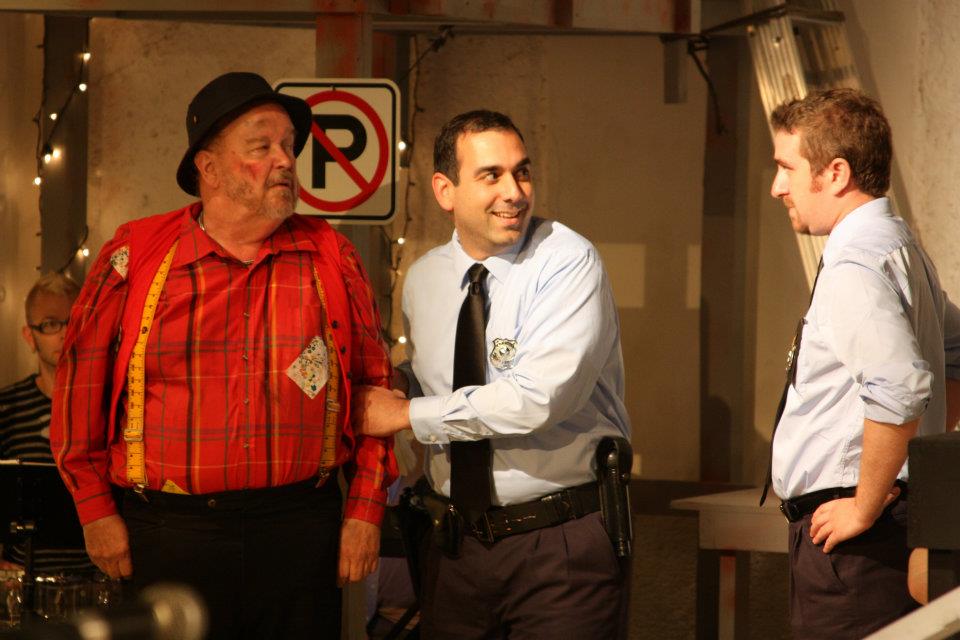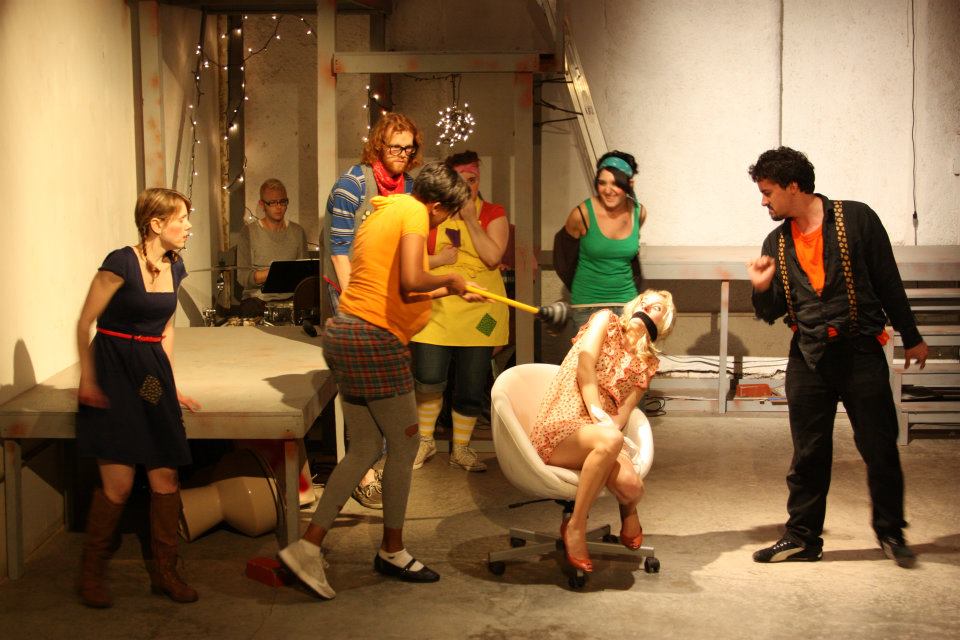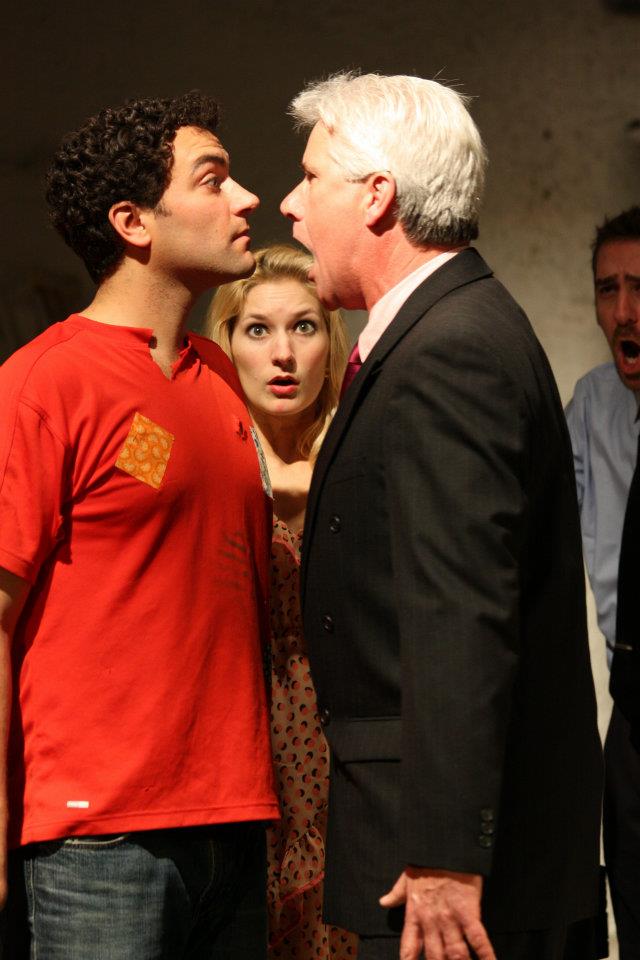
John Watson as Old Man Strong, Steve Scarpa as Officer Barrel and Jeremy Funke as Office Lockstock in the New Haven Theatre Company production of Urinetown.
Urinetown the Musical
Presented by New Haven Theatre Company through May 19 at 118 Court St., New Haven. http://www.newhaventheatercompany.com/
Music asnd lyrics by Mark Hollman. Book and lyrics by Greg Kotis. Directed by Hallie Martenson. Produced by Steve Scarpa. Musical Director: Megan Keith Chenot. Choreographer: Jenny Schuck. Stage Manager: Jeannette McDunnah. Assistant Stage Manager: Ben Michalak. Cast: Peter Chenot (Bobby Strong), Megan Chenot (Hope Cladwell), Jeremy Funke (Officer Lockstock), Sabrina Kershaw (Penelope Pennywise), Hillary Brown (Little Sally), George Kulp (Caldwell B. Cladwell), Erich Greene (Senator Fipp), Ralph Buonocore (Mr. McQueen), Officer Barrel (Steve Scarpa), Ben Michaelak (Tiny Tom), Bryuan Kearny (Robby the Stockfish/Cop), Catie Pacileo (Soupy Sue/Cop), James Leaf (Hot Blades Harry), Jessica Meyers (Little Becky Two-Shoes), John Watson (Old Man Strong), Margaret Mann (Josephine Strong), Josie Kulp (Miss Millennium/Cop).
Nice to see how neatly Urinetown has trickled down (to coin a phrase) from the arch, grandiose Brechtian staging of its original New York production—and the even grander archness of its first national tour, one of the oddest fits ever attempted at the Oakdale Theatre’s old Broadway series—to bare spaces, calmer voices and unbrassy arrangements. New Haven Theatre Company, a company I admire for its ensemble ability to take on new challenges whilst still acknowledging its natural limitations—has never done a musical (at least in this configuration of the company, which stretches back close to 20 years and several distinct regimes); given that they haven’t, it’s rather incredible how well the troupe’s familiar key members all can sing.
Married actors Peter and Megan Chenot, co-star as Bobby Strong (the activist who fights for public rest rooms to be free, after his father is sent to the fabled Urinetown for inability to pay to pee) and Hope Cladwell (rebellious, if still sweet-natured, daughter of the ruthless industrialist Caldwell B. Cladwell). They are believably in love, and harmonize neatly. As Hope’s dirtbag dad, George Kulp nails his charmingly cruel patter songs. Every member of the cast mines special details about the characters and exploits them. There’s a richness here that removes Urinetown from its political-cartoon origins and proves its worth as a well-rounded theater piece.
The company falls into the form as comfortably as they did for the agitprop drama Waiting for Lefty (a jumping-off point stylistically for this equally strident, if less earnest current project) or the more modernist Glengarry Glen Ross or the differently madcapped Steve Martin comedy Picasso in the Lapin Agile.
What connects all these shows is NHTC’s antic ensemble energy. Unlike a lot of community-based theaters, New Haven Theatre Company doesn’t try to ape a show’s best-known style; the show’s carefully rethought for the available talents and resources. Thus Glengarry became atypically brisk and comic, Picasso less filmic and declaratory, Waiting for Lefty less… lefty?
“When you’re doing theater in a space as intimate as 118 Court Street,” Urinetown’s director Hallie Martenson told me, “it’s going to change.” Almost nobody in the company, including Martenson, had seen Urinetown before, and indeed the show’s had something of a lull since a spate of regional productions following its 001 Broadway acclaim, and an even bigger burst of productions when the rights trickled down to colleges eight or nine years ago.
“The great thing about this play,” Martenson says, “is that it’s not just rich people and poor people. Everybody has a name. You can make a character yours. We’re having a lot of fun.”
This Urinetown is more personal, more personable, than a lot of productions which play on the faceless alienist dramatic Brechtian pastiche of the show. NHTC doesn’t lose that theme—though a two-man band keyboard-and-drum orchestra, however good, can’t bring the brass and pomp which is part and parcel of the Weill style being parodied in the score. The company just allows itself more to play with. Political theater is mocked (and honored—Martenson refused to double-cast anyone playing a rich person as a poor one and vice versa, subliminally underscoring the class divides in the piece), but so is overemotional melodrama and American Idol overkill (courtesy of the impressive pipes of Penelope Pennywise, given flash and verve by the dynamic Sabrina Kershaw) and improv-sketch frivolity.

Little Sally (Hillary Brown, left) and other poor folks of Urinetown kidnap Hope Cladwell (Megan Chenot).
In any case, it’s crucial that, as Martenson puts it, the show “just cooks along. This is not a play that gives itself to lengthy exposition.” Quite the contrary—the narrator figure, Officer Lockstock, continually dashes hopes for a conventional plot by explaining the conventions more than he does the plot. Jeremy Funke gives the role nonchalant menace, loosening the tightly wound, angular and inhuman style associated with Jeff McCarthy, who originated the role (or Tom Hewitt, or continued that style on tour).
I’ve always admired Urinetown for having the courage of its comic convictions. It lampoons its own format, yet respects the need for a longform musical to HAVE a format. It stays funny from beginning to end yet allows for the sort of gentle coming-together tune (“I See a River”) the audience begins to crave. In that respect, it’s like Hair—chaotic and brutal, yet not afraid to be beautiful.
This is a Urinetown which gets ALL the jokes, and scales them to where they’re funny to intimate audiences. It’s one where the closing full-cast cry of “Hail Malthus!” is clearly hard, and makes you want to go home and read up on Robert Thomas Malthus’ theories of population growth and economic/environmental stability. It’s one which lives up to the concept that freedom is scary.
Quirky rather than a boisterous, a hipster joke rather than a political cartoon, raw in all the best ways (from the unpredictability of the performances to the natural echo of the big bare 118 Court Street storefront), this is a Urinetown for New Haven. You can see why New Haven Theatre Company was moved to settle there.

